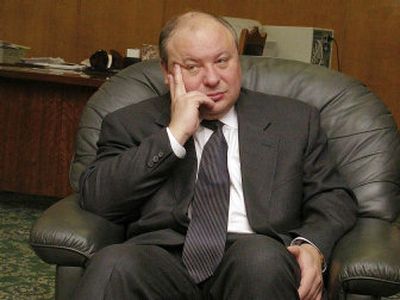Sudden illness of Russian stirs poisoning fears

DUBLIN, Ireland – Irish authorities launched an inquiry Thursday into the sudden and violent illness of former Russian Prime Minister Yegor Gaidar, whose aides said he might have been poisoned.
Gaidar’s illness appeared to deepen the mystery surrounding last week’s poisoning death of Russian dissident Alexander Litvinenko in London, although there was no immediate indication from investigators that the cases were linked.
Irish diplomats in Moscow interviewed the 50-year-old economist and academic, who told them doctors had concluded that “any radiological poisoning has been excluded,” Irish government sources said.
But in Moscow, aides and associates of the former minister, who was a chief architect of Russia’s transition to a market economy, said doctors believed “poisoning” was the most likely explanation for his condition.
“At this stage, the main version is poisoning. We will have to wait for the doctors’ verdict to find out whether it was a food poisoning or something else,” Gaidar’s spokesman, Valery Natarov, said in a telephone interview. He said a final diagnosis was expected as early as today.
Gaidar’s daughter, Maria, told the BBC, “It’s not an official conclusion, but so far the doctors cannot see any other reason (for) the condition of my father than that he was poisoned.”
She said family members believed he might have been the victim of a “political poisoning” with “an idea of destabilization of (the) situation in Russia” but added that the family did not suspect Russian authorities.
A team of detectives began interviewing hospital staff and embassy employees Thursday at the hospital near Dublin where Gaidar was treated and at the university where he fell ill after an academic conference Saturday.
Irish foreign ministry spokesman Myles Doherty said Dublin authorities had no evidence of a deliberate poisoning. “We haven’t learned of anything that would suggest that there was anything untoward about the illness,” he said.
But an official source in Dublin said Irish authorities were moving quickly to determine what happened.
In London on Thursday, more than 5,500 people called a hotline set up to identify passengers on at least 221 flights flown between London and Moscow by five passenger jets that counterterrorism investigators say are of interest in connection with the Litvinenko case. At least two of the jetliners have shown traces of the radioactive substance that apparently killed Litvinenko, polonium-210.
Authorities have said there is little chance of damaging exposure unless the substance is ingested. But they are attempting to screen passengers and those who were at the central London sushi restaurant, hotel and other locations that also have shown the presence of polonium-210.
As of Wednesday night, 69 people had been referred to a health agency for screening, and, of those, 18 were referred to a special clinic for examination, Home Secretary John Reid told Parliament on Thursday. None of the nearly three dozen urine tests conducted so far have shown radioactivity, he said.
Gaidar has been a controversial figure in Russia because the economic reforms he engineered plunged millions into poverty while allowing a handful of businessmen to become billionaires. He has kept a relatively low profile recently, running the Institute for the Economy in Transition, a think tank in Moscow.
Anatoly Chubais, an ally of Gaidar’s during Russia’s transition to capitalism who survived an assassination attempt in 2005, told the Interfax news agency in Moscow that forces opposed to Russian President Vladimir Putin may have had a hand in the Litvinenko and Gaider cases, and also the recent murder of journalist Anna Politkovskaya.